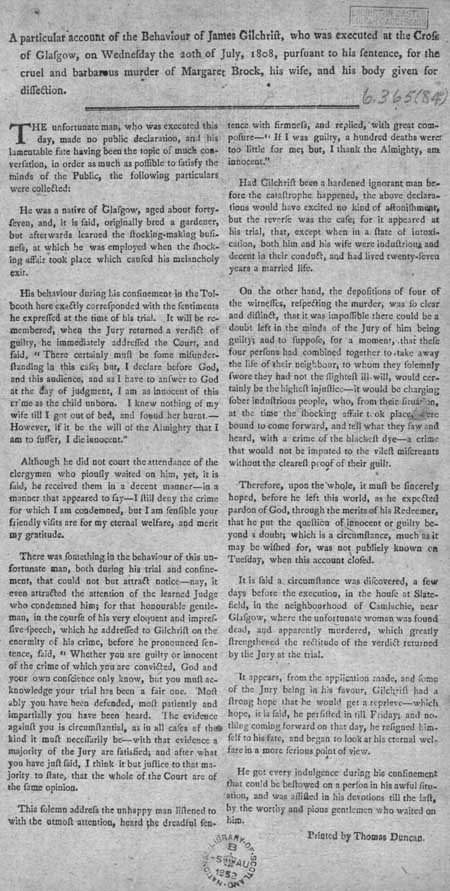Transcription
A particular account of the Behaviour of James Gilchrist, who was executed at the Cross
of Glasgow on Wednesday the 20th of July, 1808, pursuant to his sentence, for the
cruel and barbarous murder of Margaret Brock, his wife, and his body given for
dissection. THE unfortunate man who was executed this
day, made no public declaration, and his
lamentable fate having been the topic of much con-
versation, in order as much as possible to satisfy the
minds of the Public, the following particulars
were collected: He was a native of Glasgow, aged about forty-
seven, and, it is said, originally bred a gardener,
but afterwards learned the stocking-making busi-
ness, at which he was employed when the Shock-
ing affair took place which caused his melancholy
exit, His behaviour during his confinement in the Tol-
booth here exactly corresponded with the sentiments
he expressed at the time of his trial. It will be re-
membered, when the Jury returned a verdict of
guilty, he immediately addressed the Court, and
said, " There certainly must be some misunder-
standing in this cafe; but, I declare before God,
and this audience, and as I have to answer to God
at the day of judgment, I am as innocent of this
crime as the child unborn. I knew nothing of my
wife till I got out of bed, and found her burnt.--
However, if it be the will of the Almighty that I
am to suffer, I die innocent," Although he did not court the attendance of the
clergymen who piously waited on him, yet, it is
said, he received them in a decent manner--in a
manner that appeared to say--I Still deny the crime
for which I am condemned,. but I am sensible your
friendly visits are for my eternal welfare, and merit
my gratitude. There was something in the behaviour of this un-
fortunate man, both during his trial and confine-
ment, that could not but attract notice--nay, it
even attracted the attention of the learned Judge
who condemned him; for that honourable gentle-
man, in the course of his very eloquent and impres-
five-speech, which he addressed to Gilchrist on the
enormity of his crime, before he pronounced sen-
tence, said, Whether you are guilty or innocent
of the crime of which you are convicted, God and
your own conscience only know, but you must ac-
knowledge your trial has been a fair one. Most
ably you have been defended, most patiently and
impartially you have been heard. The evidence
against you is circumstantial, as in all cafes of the
kind it must necessarily be--with that evidence a
majority of the Jury are satisfied; and after what
you have just said, I think it but justice to that ma-
jority to state, that the whole of the Court are of
the same opinion. This solemn address the unhappy man listened to
with the utmost attention, heard the dreadful fen- tence with firmness, and replied,with great com-
posure--"If I was guilty, a hundred deaths were
too little for me; but, I thank the Almighty, am
innocent." Had Gilchrist been a hardened ignorant man be-
fore the catastrophe happened, the above declara-
tions would have excited no kind of astonishment,
but the reverse was the case; for it appeared at
his trial, that, except when in a state of intoxi-
cation, both him and his wife were industrious and
decent in their conduct, and had lived twenty-seven
years a married life. On the other hand, the depositions of four of
the witness, respecting the murder, was so clear
and distinct, that it was impossible there could be a
doubt left in the minds of the Jury of him being
guilty; and to suppose, for a moment, .that these
four persons had combined together to take away
the life of their neighbour, to whom they solemnly
swore they had not the Highest ill-will, would cer-
tainly be the highest injustice--it would be charging
sober industrious people, who, from their situation,
at the time the shocking affair took place were
bound to come forward, and tell what they saw and
heard, with a crime of the blackest dye--a crime
that would not be imputed to the vilest miscreants
without the clearest proof of their guilt. Therefore, upon the whole, it must be sincerely
hoped, before he left this world, as he expected
pardon of God, through the merits of his Redeemer,
that he put the question of innocent or guilty be-
yond a doubt; which is a circumstance, much as it
may be wished for, was not publicly known on
Tuesday, when this account closed. It is said a circumstance was discovered, a few
days before the execution, in the house at Slate-
field, in the neighbourhood of Camlachie, near
Glasgow, where the unfortunate woman was found
dead, and apparently murdered, which greatly
strengthened the rectitude of the verdict returned
by the Jury at the trial. It appears, from the application made, and some
of the Jury being in his favour, Gilchrist had a
strong hope that he would get a reprieve--which
hope, it is said, he persisted in till Friday; and no-
thing coming forward on that day, he resigned him-
self to his fate, and began to look at his eternal wel-
fare in a more serious point of view. He got every indulgence during his confinement
that could be bestowed on a person in his awful situ-
ation, and was assisted in his devotions till the last,
by the worthy and pious gentlemen who waited on
him. Printed by Thomas Duncan,
View Commentary | Download PDF Facsimile
|
 |
Date of publication:
1808 shelfmark: 6.365(084)
 View larger image
View larger image
|


